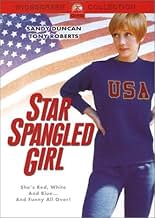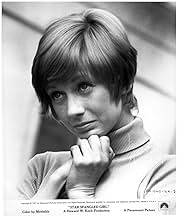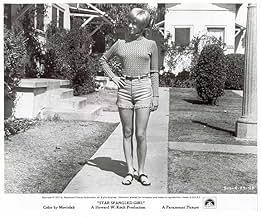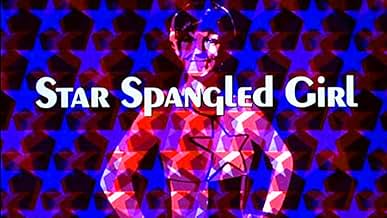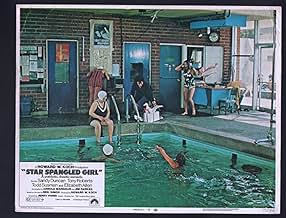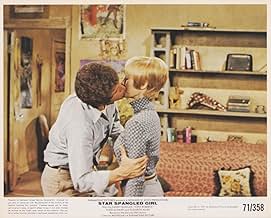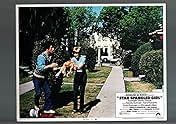In this adaptation of Neil Simon's stage play, 1960's radical journalists Norman Cornell and Andy Hobart fall in love with the girl next door, patriotic Olympic hopeful Amy Cooper, who is th... Read allIn this adaptation of Neil Simon's stage play, 1960's radical journalists Norman Cornell and Andy Hobart fall in love with the girl next door, patriotic Olympic hopeful Amy Cooper, who is the kind of square that they are fighting.In this adaptation of Neil Simon's stage play, 1960's radical journalists Norman Cornell and Andy Hobart fall in love with the girl next door, patriotic Olympic hopeful Amy Cooper, who is the kind of square that they are fighting.
- Director
- Writers
- Stars
- Awards
- 1 nomination total
- Landlady
- (as Betty Ellen)
- Mr. Karlson
- (as Artie Lewis)
- Neighbor
- (uncredited)
- Checker in Market
- (uncredited)
- Policeman
- (uncredited)
- Policeman
- (uncredited)
- Neighbor
- (uncredited)
- Director
- Writers
- All cast & crew
- Production, box office & more at IMDbPro
Featured reviews
Fingernails on chalkboard
Duncan was talented, but this is the nadir of the early "extra-perky girl" roles her career was trapped in for a while. The amazing thing is that Todd Susman, who plays one of two not-remotely-convincing "hippie" boys living next door to her Georgia emigre in Los Angeles, is much more grating. Tony Roberts cannot escape the pervasive sitcom rhythms, but manages to look comparatively good by simply not acting like a dog on its hind legs for 90 minutes. What passes for big comic setpieces, when they're not just like multicamera living-room sitcom scenes, are pathetically bad-the one where a duck gets loose at the YMCA pool makes the slapstick in Duncan's Disney vehicles look like Jacques Tati, it's so haplessly staged and edited.
How did this movie get made? Its prospects were so forlorn, the best it could manage was a title song sung by Davy Jones, the former Monkee whose own career as a recording artist died with the Prefab Four's demise some years earlier. This movie isn't just unfunny, it's shrill, flat, and rather desperate, with no one onscreen resembling a human being...or being entertaining as a caricature of one.
See Star Spangled Girl and laugh your head off!
Okay, I admit it. I love Sandy Duncan.
The movie looks quite good despite a modest budget, but part of the reason for this is that it is just another filmed play, with limited cinematic ambitions beyond creating a credible scenic background for the dialogue. This is true of so many adaptations of stage plays: they tend to be no more visually sophisticated than the average sit-com. SSG is well cast, with Tony Roberts especially good in one of his trademark fast-talking roles as one of the radicals. Sandy Duncan looks cute and holds her own as the stubborn, clean-cut object of his romantic attention and political exasperation. Known for family friendly TV projects mostly, Sandy nevertheless could reach down and give her end of the dialog a little spitfire bite where necessary. Go girl!
The script itself reads a bit 'lite' as an exercise in political head- banging though. The Vietnam period was ALL about politics and revolution and youth culture and the 'radicals' seem rather tame and naive in that context. Neil Simon could have found stronger stuff in ANY underground newspaper around at that time than he put into the script, and this tends to weaken the credibility of everything. The movie is clearly aimed at a middle American audience and tries not to be too frightening or threatening on the subject of political strife. That wouldn't play in Kansas City, as the movie moguls used to say.
Worth a watch.
"If you wanna make it with a girl like that you need big gestures!" ... "Try burning down Atlanta."
A time waster, but appealing.
It's not a bad film as such, but showcases a kind of self indulgent nature by the theatre elite who want more to show their abilities for the sake of it. Not a bad aim, but it does get somewhat tiring.
I think one of the key things about this film is that there isn't too much umph. And it could be because Simon is slightly out of his element here, writing about a place he wants to be part of, but is wholly unfamiliar with. Ergo we get quick witted Southern California characters with New York sensibilities, when their social extraction is Manhattan beach, and not Manhattan itself.
Still, it has a certain charm, even if the characters are reluctant fish out of water via Simon's writing. Southern California doesn't bother with lots of well educated verbiage loaded with political references, but more rather how life can be easier, and is not to be taken too seriously. So it is with the LA metroplex with lots of petty desires and image seeking. So it is that Simon misses the mark with this play set in such a milieu, and so it is that Star Spangled Girl remains an interesting experiment.
See it once.
Did you know
- TriviaThe film was made and released about five years after its source play of the same name by Neil Simon was first performed in 1966. The original Broadway production of "Star Spangled Girl" opened at the Plymouth Theater on 21st December 1966 and ran for 261 performances until 5th August 1967. It starred Connie Stevens, Anthony Perkins and Richard Benjamin. The theater marquee for the production can be seen during the opening titles of TV series That Girl (1966). The play's setting is described in its intro as being "A duplex studio apartment in San Francisco".
- Quotes
Norman Cornell: I'm sorry for what happened...
Amy Cooper: That's alright.
Norman Cornell: Andy... she spoke nicely to me...
- ConnectionsReferences King Kong (1933)
- SoundtracksGirl
Written by Charles Fox & Norman Gimbel
Performed by Davy Jones
recording supervised by Jackie Mills

